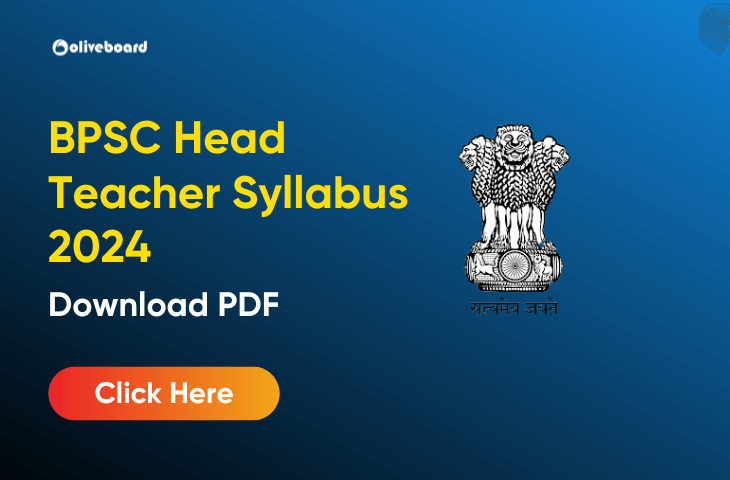BPSC Head Teacher Syllabus 2024
The Bihar Public Service Commission (BPSC) has released the BPSC Head Teacher Syllabus 2024 on their official website. Aspiring candidates can conveniently download the BPSC Head Teacher Syllabus 2024 PDF by accessing the provided download link. It’s essential for candidates to thoroughly review the BPSC Head Teacher Syllabus to gain a comprehensive understanding of the topics and ensure preparedness for the BPSC Head Teacher Exam 2024.
BPSC Head Teacher Syllabus 2024 – Overview
Candidates must thoroughly review the BPSC Head Teacher Syllabus 2024 & Exam Pattern to gain a comprehensive understanding of the curriculum’s breadth required to successfully pass the BPSC Head Teacher Exam 2024.
| Conducting Body | Bihar Public Service Commission (BPSC) |
| Post Name | Head Teacher |
| Vacancy | 40247 |
| Advt. No. | 25/2024 |
| Type of Questions | Objective Types Multiple Choice Questions |
| Total Number of Questions | 150 |
| Total Marks | 150 |
| Marks Division | – General Studies: 75 marks – D.El.Ed: 75 marks |
| Marking Scheme | – 1 mark for each correct answer – 0.25 deducted for each wrong answer |
| Exam Duration | 2 hours |
| Official website | https://www.bpsc.bih.nic.in/ |
BPSC Head Teacher Syllabus 2024
Unit 1: Understanding Childhood and Education in Society
- Cultural and historical perspectives on childhood
- Child rights in various contexts
- The interplay between education, society, and schools
- Factors influencing socialization in educational settings
- Conceptualizing education: philosophical, psychological, and sociological approaches
- The nature and objectives of school education
- Philosophical perspectives on knowledge
Unit 2: Educational Philosophies and Innovators
- Mahatma Gandhi’s concept of education in Hind Swaraj
- Gijubhai Badheka’s experimental approach to education
- Rabindranath Tagore’s emphasis on freedom and autonomy in learning
- Maria Montessori’s methods outlined in “The Receptive Mind”
- Educational insights from historical figures like Jyotiba Phule and Dr. Zakir Hussain
- J. Krishnamurthy’s views on education through dialogue
- John Dewey’s ideas on education’s role in society
Unit 3: Child Development and Pedagogy
- Curriculum concepts and foundations
- Integrating work and education in the curriculum
- Psychosocial factors influencing childhood
- Understanding child development and growth
- Physical and cognitive development in children
- The significance of creativity and play in child development
- Personality development and theories like Erikson’s
- Emotional and moral development theories by John Bowlby, Jean Piaget, and Lawrence Kohlberg
Unit 4: Early Childhood Care and Education (ECCE)
- Importance and objectives of ECCE
- Designing balanced and contextualized ECCE curriculum
- Creating inclusive environments for early childhood education
- Addressing the needs of children with disabilities
- Importance of physical education in ECCE
- Challenges and innovations in early childhood education in Bihar
Unit 5: School Organization and Management
- Understanding school culture and structure
- Changes in the school system under Right to Education
- Inclusive education practices in school organization
- Integrating art into classroom teaching
- Importance and implementation of co-curricular activities
- Assessment and evaluation methods in schools
- Teacher professional development and leadership
Unit 6: Educational Institutions at Different Levels
- Roles and functions of district and state-level educational institutions
- National-level educational organizations and their significance
Unit 7: Inclusion, Diversity, and Gender Sensitivity
- Addressing inclusion and exclusion in Indian society
- Managing diversity and inequality in classrooms
- Assessment practices for inclusive education
- Challenges and context of inclusive education in Bihar
- Addressing gender discrimination in education
- Role of education in promoting gender sensitivity and equality
Unit 8: Curriculum Frameworks and Integration of Technology
- Understanding national and state curriculum frameworks
- Utilizing audio-video and multimedia tools in teaching
- Integration of ICT in learning and school planning
BPSC Head Teacher Exam Pattern 2024
The BPSC Head Teacher Exam Pattern 2024 contains 150 objective type multiple-choice questions, split evenly between General Studies and D.El.Ed sections. Each correct answer earns 1 mark, with a penalty of 0.25 marks deducted for each incorrect response, and the examination duration is set at 2 hours.
| Question Format | Objective Type Multiple Choice Questions |
| Total Number of Questions | 150 |
| Total Marks | 150 |
| Marks Allocation | – General Studies: 75 marks – D.El.Ed: 75 marks |
| Marking Scheme | – Correct Answer: 1 mark – Incorrect Answer: Deduction of 0.25 marks |
| Exam Duration | 2 hours |
BPSC Head Teacher Syllabus PDF
To access the BPSC Head Teacher Syllabus in PDF format, candidates can utilize the provided links for both General Studies and D.El.Ed sections. Simply click on the respective links below to find the detailed syllabus for the BPSC Head Teacher Exam 2024.
BPSC Head Teacher Syllabus 2024 – FAQs
Ans. You can expect Objective Type Multiple Choice Questions in the BPSC Head Teacher Exam.
Ans. The total number of questions in the BPSC Head Teacher Exam is 150.
Ans. Each correct answer in the BPSC Head Teacher Exam is awarded 1 mark.
Ans. There is a deduction of 0.25 marks for each incorrect answer in the BPSC Head Teacher Exam.

Hello there! I’m a dedicated Government Job aspirant turned passionate writer & content marketer. My blogs are a one-stop destination for accurate and comprehensive information on exams like Regulatory Bodies, Banking, SSC, State PSCs, and more. I’m on a mission to provide you with all the details you need, conveniently in one place. When I’m not writing and marketing, you’ll find me happily experimenting in the kitchen, cooking up delightful treats. Join me on this journey of knowledge and flavors!
